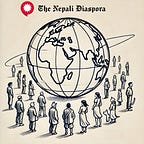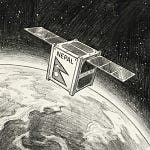From financial crackdowns to earthquake tremors, Nepal has had a shaky but eventful week! The central bank is tightening its grip on suspicious transactions, while internet shutdown threats and infrastructure delays keep tensions high. On the bright side, exports are booming, luxury imports show resilience, and Nepal just opened its first-ever embassy in Portugal—all as record numbers of Nepalis head abroad for work. Whatever the challenge, Nepalis keep pushing forward—at home and beyond!
Help spread the news! Let’s keep busy Nepalis worldwide informed—forward it now! 📩
Economy & Development 💸
Nepal Rastra Bank (NRB) is tightening its grip on financial oversight following the country's re-entry onto the Financial Action Task Force (FATF) grey list. The central bank has directed three major state-owned financial entities—the Employees’ Provident Fund (EPF), Citizen Investment Trust (CIT), and Social Security Fund (SSF)—to scrutinize transactions of high-ranking officials and their families, aiming to curb potential money laundering. These institutions must enhance Know Your Customer (KYC) protocols and report suspicious activities within three days.

To ease a growing cash shortage in banks, NRB is injecting Rs 30 billion in repo funds—a short-term borrowing tool to boost liquidity.. Meanwhile, a shift in auto loan policies is stirring debate, as NRB has tightened lending rules for electric vehicles while easing restrictions on fossil-fuel-powered ones—potentially slowing EV adoption and favoring petrol and diesel car imports (Republica, THT, Nepal News).
Infrastructure and digital connectivity are facing roadblocks, with two key sectors experiencing uncertainty. The Upper Myagdi Hydropower Project (37 MW) has finally kicked off, backed by an investment of over Rs 6.6 billion, with a completion target of mid-2026. Once operational, it aims to generate 215.7 GWh of electricity annually, easing Nepal’s power deficit. In contrast, Nepal’s internet service providers (ISPs) are once again warning of a potential shutdown due to government delays in approving foreign exchange payments. Despite settling outstanding dues, ISPs claim the Ministry of Communications is withholding approvals, leaving Indian upstream providers like Airtel and Tata unpaid. This bureaucratic deadlock threatens national connectivity, especially as ISPs highlight past internet blackouts linked to unresolved debts (Republica, KTM Post).
Meanwhile, economic and infrastructure developments are showing mixed trends. While concerns persist over Nepal’s economic slowdown, rising imports of luxury goods and high-tax items have boosted customs revenue by 17%, indicating strong domestic demand. In trade, exports through the Birgunj border have nearly doubled, led by shipments of refined soybean and sunflower oil. Additionally, the government has begun constructing an alternative route for the Mugling-Narayanghat highway, aiming to ease congestion and mitigate landslide disruptions. On a broader economic note, ADB’s chief economist has praised Nepal’s strides in poverty reduction but stressed the urgency of moving beyond a remittance-driven economy to one based on productivity and job creation (Republica, KTM Post, Republica).
Social & Cultural ⭐
A 6.1-magnitude earthquake shook Sindhupalchok early Friday, jolting residents awake and sending many outdoors in panic. Though no major damage was reported, the tremor—felt strongly in Kathmandu Valley—was a stark reminder of Nepal’s seismic risks. Social media lit up with calls for better disaster preparedness and early warning systems. (KTM Post)
Meanwhile, Maha Shivaratri celebrations brought tens of thousands of devotees to Pashupatinath Temple, where sadhus and pilgrims openly smoked marijuana—a rare exception to Nepal’s otherwise strict drug laws. While many advocate for cannabis legalization, authorities continue to tread cautiously. Other major temples, including Doleshwor Mahadev in Bhaktapur, also saw massive turnouts, with over 60,000 worshippers participating in midnight rituals and sacred fire ceremonies. Elsewhere, Nepal received positive health news, as WHO reaffirmed the country’s sustained elimination of maternal and neonatal tetanus, citing continued success in vaccination programs and maternal healthcare services. (THT, KTM Post)
Nepal’s eucalyptus boom, once promoted as a cash crop, is now raising concerns over soil degradation and water depletion, highlighting the tension between economic forestry and ecological sustainability. Meanwhile, a study reveals LGBTQI+ youth face high anxiety and depression, with limited access to mental health support due to stigma and financial barriers. At the same time, debate over divorce laws is heating up, with growing calls for gender-balanced reforms amid claims that current policies favor women in property division.(Mongabay, KTM Post, Republica)
Enjoyed this issue? 📩 Share it with a friend & let’s keep Nepalis worldwide in the loop! Got thoughts? Hit reply—we’re all ears!
Politics & Governance 🪧
Nepal is making strides on the global stage as Foreign Minister Arzu Rana Deuba seeks international support for the country’s candidacy to the UN Human Rights Council for the 2027-2029 term. Addressing representatives in Geneva, Deuba highlighted Nepal’s progress in human rights, particularly in protecting women, children, and minorities, and emphasized the nation’s commitment to democracy and transitional justice. This move underscores Nepal’s growing role in global human rights advocacy KTM Post .
Meanwhile, the Office of the Prime Minister and Council of Ministers (OPMCM) unveiled its E-Governance Blueprint, aiming to transform public services through digital technology. The blueprint focuses on transparency, accountability, and efficiency, with plans to establish a Data Protection Authority and enhance digital literacy. This initiative reflects the government’s push to modernize governance and improve service delivery. At the same time, Prime Minister KP Sharma Oli addressed the misuse of digital technology, stressing the need for international cooperation to combat digital crimes while ensuring citizens’ rights to use social media responsibly My Republica, THT .
In a surprising development, former King Gyanendra Shah released a video message on the eve of Nepal’s 75th Democracy Day, calling for national unity and hinting at a potential return to the monarchy. His statement has reignited debates about Nepal’s political identity, with royalist groups rallying behind his call while major political parties dismissed it as divisive. Shah’s appeal reflects growing disillusionment with the current political system and has stirred conversations about the monarchy’s role in Nepal’s future Nepal News .
Did you know ❓
Yak Cheese Was Introduced by a Swiss Man. While many Nepalis take pride in yak cheese as part of their Himalayan heritage, few know that its commercial production in Nepal began with a Swiss dairy expert! In the 1950s, Fritz Maurer helped set up Nepal’s first yak cheese factory in Langtang, introducing European techniques to enhance local cheese-making traditions. Today, Nepal remains one of the few places in the world where authentic yak cheese is produced, but here’s the catch—most "yak cheese" sold in Kathmandu isn’t actually from a yak! Since only female yaks (called nak) produce milk, technically, it should be called nak cheese—but the name yak cheese stuck, likely because it’s more marketable. Whether you try it fresh or aged, this protein-rich, umami-packed cheese is a must-taste if you visit Langtang, Rasuwa, or Dolpo.
Diaspora & Globalization 🌎
Nepal has officially opened its first embassy in Portugal, a major step in strengthening diplomatic ties and improving services for the growing Nepali community. The newly set-up Lisbon office has launched a mobile consular service, assisting with passport renewals, document authentication, and kinship verification, already handling hundreds of applications. As more Nepalis seek opportunities in Europe, officials are working toward a permanent embassy location for full-fledged services. Meanwhile, Nepal and China have signed an agreement to enhance cultural and ethnic cooperation, focusing on tourism, education, and governance exchanges as part of broader diplomatic outreach. (OnlineKhabar, KTM Post).
Over 465,000 Nepalis have secured work permits abroad in just seven months, underscoring Nepal’s heavy reliance on foreign employment. The UAE, Saudi Arabia, and Qatar remain top destinations, while migration to Malaysia declines due to restrictions. Meanwhile, Europe—Croatia, Cyprus, France, Poland, and Romania—is emerging as a new hub for Nepali workers. As the government works to regulate migration, policymakers stress the need for economic reforms to reduce Nepal’s dependence on remittances and boost local job opportunities. (Republica).
Let’s connect
Loved this issue? Share it with friends and help us keep Nepalis worldwide informed!📩 Share your thoughts! Let us know what you think via our Feedback form or follow us on Facebook | LinkedIn
About Nepali Diaspora Digest:
The Nepali Diaspora Digest connects the global Nepali community with curated news, insights, and stories that matter most. Join us as we celebrate and explore the diverse voices and achievements of Nepalis worldwide.
Partner shout out
belayat.uk: helping Nepalis connect in the UK on jobs, housing, events and finding local nepali owned businesses
















